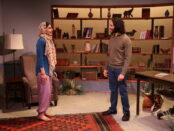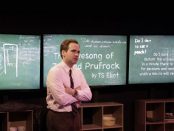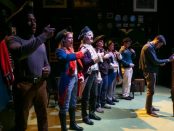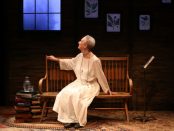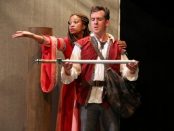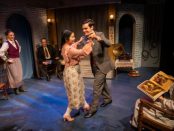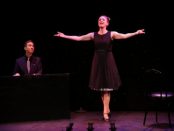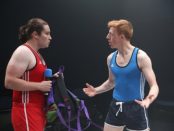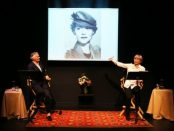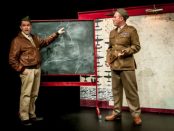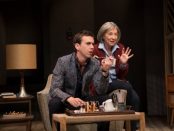59E59 Theaters
The Drama Desk Award-winning 59E59 Theaters is the number one Off-Broadway destination in New York City. In the heart of Midtown, just east of Central Park, 59E59 Theaters is a spectacular modern theater complex with three stages and a lively bar on the mezzanine level. http://www.59e59.org/
Pyle is an engaging performer. However, not only does her story wander around but the interruptions by her father or rather her day dreams about past lovers become hard to follow due to all the disconnects. Her father follows an ex-wife to Texas from Indiana while Pyle ends up in Los Angeles from New York. The message is not clear until she explicitly states that she is “in the exact right spot.” When she removes her parka, she wears a t-shirt that states: “What if it all works out?” which appears to be the take away from the evening. [more]
Heartland
While Gabriel Jason Dean’s "Heartland" is an enlightening play about Afghan culture mentioning the classic poet Rumi and the contemporary novelist Atiq Rahimi, some of it will still be opaque to American audiences. On the other hand, it also reveals how American involvement in other countries may have the opposite effect of that which is intended. The fine production, however, makes this a compelling though subtle story of an extended family in its understated way. The play was first produced as part of the National Play Network Rolling World Premiere with four simultaneous productions including the one at The Geva Theatre Center in Rochester, New York. [more]
First Down
A plea for understanding the pain of being Muslin-American, Sevan’s First Down at the 59E59 Theaters focuses on the plight of an adored football player who decides to kneel and pray during the national anthem rather than stand at polite attention, hand over heart. Quarterback George Berri (a handsome, well-built, sensitive Peter Romano) is a mid-westerner with pale skin and a name that doesn’t necessarily connote his Muslim upbringing. After the Star-Spangled Banner is played, Berri, a young Lebanese/American, is first seen. He is on his knees praying in the locker room well after the game is over. Soon Coach Bill Fitzgerald (Larry Bull, finding every nuance in what could have been a clichéd macho role) enters and the structure of First Down begins to manifest itself: three conversations of increasing emotional power beginning with Coach Bill, then Berri’s agent and finally his impassioned mother. [more]
Barococo
Mandell’s costume and wig design are exquisite, perfectly defining each character in their own distinct look and style with numerous fabrics and colors and without overlap. Each of the actors’ performances are as unique as their costumes. Grastorf gets many laughs from her wide-eyed, innocently naivety (or just plain dimwittedness), and Mark Jaster’s puffy bravura and expressive face are delightfully campy. Mandell’s cantankerous bawdiness is perfectly chosen for her character, and Thomas plays the narcissistic Dauphine with laughable presumptuousness. Vernon’s pretentious, foppish roguery is spot on for his role, and Caleb Jaster as the simple musician interacts perfectly when called upon. Each actor’s facial expressions, gestures and gaits are very distinct and in line with their characters. [more]
The Collision / The Martyrdom
Throughout these plays there resonates an overarching message of female empowerment, a message that provides depth to the otherwise light comedy being served up. Nuns are habit forming, that’s what people say, and this viewer wanted nothing more than to run back and see this show again. [more]
Mr. Toole
Vivian Neuwirth’s "Mr. Toole" is a fitting tribute to a charismatic teacher and a brilliant author. However, the play, in the form it currently is in, seems to have been shoehorned into a shape it doesn’t entirely want to take. It is possible that it would be more successful as a screenplay opened up a bit. At any rate, it is a play that will be of interest to students of American fiction and those who know the two novels of John Kennedy Toole. The play may do something in the way of making Toole and his work better known. It will probably make you want to read one or both of his two novels, "A Confederacy of Dunces" and "The Neon Bible." [more]
The Commons
Could there be five more self-involved, selfish, self-deceptive characters than those who populate Lily Akerman’s "The Commons" at the 59E59 Theaters? No, these five roommates aren’t evil, just depressingly of the here and now, young people who have lost the ability to communicate honestly with each other. There’s a problem with a 90-minute play about people who do not connect: it is an unrewarding slog for an audience to sit through. [more]
The Sabbath Girl
The trite set-up makes all of the characters one-dimensional, with the Jewish Seth a “knish maker” and shop owner on “Hester Street, Angie groping to find herself--not to mention a partner--and Sophia, a loving and understanding “Nonna.” Blake, of course, is a leather-clad roué, who also wears sunglasses throughout--until he loses them. What is somewhat surprising is to learn that Seth, an orthodox Jew, was in an “arranged” marriage before, and divorced his wife two years ago. But the play suffers from an inordinate lack of surprise. [more]
How to Load a Musket
An essay more than a play, with players as opposed to characters, "How to Load a Musket" is a racist diatribe that fails to make its points coherently. The costumes and appointments on the walls of a black box space say all that there is to say in a play that ultimately leaves one wanting for more. The scenic design by Lawrence E. Moten III is the show’s best asset. [more]
BOOM
Employing an impressive array of voices and mannerisms, and only sometimes augmented with a wig or article of clothing, Miller as “Narrator” impersonates numerous performers, personalities, and politicians of the era, voicing every commercial and even dubs his own parents in short video clips at the very beginning of the piece. “100 voices. 25 years. 1 man,” the publicity statement declares, and Miller doesn’t disappoint. [more]
One November Yankee
Beloved television stars Harry Hamlin (L.A. Law) and Stefanie Powers (Hart to Hart) return to the New York stage in Joshua Ravetch’s "One November Yankee" which they previously performed at the Delaware Theatre Company, was initially seen in Los Angeles’ NoHo Arts Center Theatre in 2012. It is their star power which keeps this old-fashioned, rather sit-com-ish, interconnected triple bill as lively and as entertaining as it is despite clichéd writing and passé jokes. Playing three different sets of siblings all connected by one plane crash, they manage to be convincing in weak material. [more]
Everything Is Super Great
Stephen Brown’s "Everything Is Super Great" is a small, unpretentious play about an American family in crisis. That is not a novel theme, of course, but "Everything" rises gracefully to the occasion. Brown demonstrates his considerable skill for creating characters you can latch onto and root for. Director Sarah Norris—along with a gifted quartet of actors—has gently and thoughtfully taken Brown’s story up a notch, finding colors that may not have been evident on the page but that augment the script nicely. The resulting production is a lovely thing to behold. [more]
One Discordant Violin
What this team of artists has created is a serious piece of storytelling that is also a glorious treat for the eyes and ears. If you’ve figured that the show will just be a guy narrating a short story while another guy plays violin, you’re certain to be pleasantly surprised. [more]
A Woman of the World
Kathleen Chalfant adds another feather to her cap as Emily Dickinson’s posthumous editor Mabel Loomis Todd in the world premiere of Rebecca Gilman’s new one-woman play, "A Woman of the World," presented by The Acting Company in association with Miranda Theatre Company at 59E59 Theaters. Staged by Miranda’s artistic director Valentina Fratti with elegant assurance, Chalfant is both fascinating and seductive as this real life woman who in the 1880’s and 1890’s scandalized conventional Amherst, Massachusetts, with her liberated and bohemian behavior long before such goings on became acceptable for women – or men. [more]
The White Chip
Written by Sean Daniels, "The White Chip" is reportedly an autobiographical play, directed with an earnest finesse by Sheryl Kaller who sometimes has difficulty keeping her three different performers in character, in terms of whom they represent. If one has difficulty following the many tangents, Kaller has to be held principally responsible for that. [more]
Round Table
The problem with Vaynberg’s play, now being given its Off Broadway premiere, in which she plays the lead female role, is that it has so many interlocking plots that it can give you a headache trying to keep them straight. And as all of the actors play two and five roles it is difficult to always know who is who. While director Geordie Broadwater keeps the pace zipping along, this often makes it more of a strain to follow the convoluted plotting. Plus the extensive quoting from Tennyson’s Arthurian narrative poem, Idylls of the King (not identified until late in the play) doesn’t help a bit. [more]
Fern Hill
Tucker’s dialogue is breezy and amusing, and it’s fun to see these talented actors—all mainstays of the New York stage—being playful together. Together, they make interesting stuff out of the material they’ve been given, and they are all highly watchable. But would the play seem more fulfilling and important if there were more fully developed personal and interpersonal conflicts? [more]
Only Yesterday
As John, Christopher Sears is an enjoyable pill, perfectly offset by Tommy Crawford's Paul whose amiable placidity is almost Buddha-like. More importantly, both actors have impressive musical chops, which wonderfully serves Stevens' truncated overview of Paul and John's tuneful reminiscing about their musical influences: Chuck Berry, Bobby Freeman, Gene Vincent. Sears even has the opportunity to do a bit of Elvis Presley hip swiveling that feels absolutely perfect in its oh-so-British imperfection. [more]
Tech Support
Deborah Whitfield’s 'Tech Support" offers a clever idea in order to review feminism in the past century. Unfortunately, her rather superficial approach misses a great many opportunities. The romantic comedy aspect of the play is not entirely believable and works to the detriment of the play’s serious elements. The slick production is entertaining without ever delving below the surface even though it attempts to cover a great many important and serious issues, many of which are not yet solved today. Don’t blame the actors who do their best with the material they have been given. [more]
Summer Shorts 2019: 13th Annual Festival of New American Short Plays: Series B
Neil LaBute’s “Appomattox” is the most substantial of the three plays and deals with a topic new to his work. Two long-time friends, Frank, black, and Joe, white, are having a picnic in the park without their wives where they get to throw around a football. Joe tells Frank about a story he read in the newspaper that the freshmen at Georgetown University have decided to pay an annual reparation to the families of slaves who were sold off by the college centuries before as collateral to keep the school going. He is impressed that the $27.20 will be annually added to their tuition. For Frank, this is nothing but a symbolic gesture. He would like to see the figure sting a little for 400 years of slavery. [more]
Summer Shorts 2019: 13th Annual Festival of New American Short Plays: Series A
Series A of this year’s Summer Shorts: 13th Festival of New American Short Plays is unified around the theme of death and dying and how it affects the living. Lest you think that this sounds morbid, the three provocative one-act plays that make up this first program are so beautifully handled that this is a superior theatrical evening in three totally different styles. Unlike many evenings of one acts, the productions of all three are worth of your attention and could not be bettered. [more]
Two’s a Crowd
Co-written by and starring Rita Rudner (who is not only a playwright and performer but also an author, film writer, producer and director, with many TV appearances to her credit), "Two’s a Crowd" suggests that it’s creator has run out of original ideas and is recycling old ones--not only others, but her own. It really lands with a thud, which also may have a lot to do with trying to present it as a musical. [more]
Monica: This Play is Not About Monica Lewinsky
The title of playwright Dianne Nora’s fascinating new work, "Monica: This Play is Not About Monica Lewinsky," is disingenuous. Is it about you-know-who? Well, yes and no. There were passing references to the title character’s notoriety and enough images of and quotes from President Clinton, among others, to imply that the title is, at best, a white lie; at worst it is a tongue-in-cheek bait-and-switch. But if that is a way of getting an audience to see this incisive and adult drama, then more power to Ms. Nora who knows how to write sharply focused dialogue. [more]
Julie Madly Deeply
Andrews’ worldwide success with the films "The Sound of Music" and "Mary Poppins" is well represented here, as is the Broadway musical that established her in the first place, "My Fair Lady," even if "The Boyfriend" preceded it. The current run of "Julie Madly Deeply" at 59E59 Theaters follows its playing first in London’s West End and then in Toronto. It was written by Young, with contributions from Russell Lucas, who has also directed the show in a full-steam-ahead mode. [more]
Square Go
Scottish playwrights Kieran Hurley and Gary McNair explore the murky pre-adult domain with candor and humor in "Square Go," an appealing two-hander directed by Finn Den Hertog and featuring two fully adult actors, Daniel Portman and Gavin Jon Wright, portraying—respectively—Max and Stevie, a pair of 13-year-old besties who seem to transform, regularly, into each other’s biggest enemy. There are hilarious moments in the play, but Hurley and McNair don’t treat the characters in a condescending way. [more]
Feral
All of this is brought to life via digital camera, which captures the movement of the figures on a quickly assembled “set” that is, in effect, a whole miniature seaside town, with businesses and homes through which the various human, animal and automotive figures navigate. At one very “meta” point, we even see a Punch and Judy show at a town festival: puppets putting on a puppet show! [more]
Posting Letters to the Moon
The epistolary "Posting Letters to the Moon" may, on the face of it, make one think of A. R. Gurney’s "Love Letters" or Helene Hanff’s "84 Charing Cross Road. "But unlike those two memorable plays, PLTTM as “compiled” by Lucy Fleming, whose mother was the British actress Celia Johnson and whose father Peter Fleming was a travel writer--as well as the older brother of James Bond creator, Ian Fleming--never really tells a story nor conveys what her parents’ relationship was like. [more]
Instructions for American Servicemen in Britain
Likability is in short supply nowadays and the three playwright/performers who created this comedy, based on an actual pamphlet handed to Americans during World War II, have spun the dry, inadvertently funny, official publication into a delightfully involving charmer. (Copies of the actual pamphlet are available in the lobby.) Dan March, James Millard and Matt Sheahan, the actors, along with John Walton, the show’s director and co-author, treat the audience members as the American soldiers on English soil for the first time, totally ignorant of the British customs, language, sports, food, etc. There’s a lot of winking going on to be sure as Lieutenant Schultz (Millard) and Colonel Atwood (March), Americans, and Major Gibbons (Sheahan), an Englishman, share with us everything we wanted to know about Britain but were afraid to ask. [more]
Killing Time
This British production is a family effort, as Forsyth and Mills are mother and daughter in real life. The play is worth seeing primarily for the sharp and uncompromising performance of Forsyth, whose blunt-talking, often-witty Hester is a joy to watch, even in her darkest moments. The production also uses Forsyth’s skills as a cellist—and as a composer—to great effect. [more]
I Carry Your Heart
Though playwright Kelly strives for poetry at times--in addition to that last quote, consider Josh’s mother calling him a “terminal optimist” and also learning that the play’s title is taken from e. e. cummings--it’s more or less done in by her contrivances. She also conveys too much of the exposition through her biggest contrivance of all: Debra, an author, has left behind a memoir for Phoebe to read, and she reads it aloud to Blake, thereby imparting much of Debra’s story. [more]
Smart Blonde
Using the premise of a 1964 recording session that stimulates her many memories, good and bad, the play serves as a moving tribute to Holliday even though it doesn’t shy away from the darker side of her life. In truth, it is the contrast between her brilliant professional career and her personal unhappiness that makes Holliday and this play so moving. [more]
Switzerland
Mystery writer Patricia Highsmith ("Strangers on a Train," "Carol," "The Talented Mr. Ripley") was famously alcoholic, depressive, misogynistic and racist. She was unique as an internationally famous writer who had created in Tom Ripley the only serial killer ever created by a woman writer. In "Switzerland," Joanna Murray-Smith, one of Australia’s most successful playwrights, has written a play about the last days of this reclusive writer’s life. Directed by Dan Foster, the initially fascinating premise takes a sharp turn into territory that requires a good deal of suspension of disbelief. [more]
The Waiting Game
Welcome to "The Waiting Game," a play by Charles Gershman, which has the makings for a meaningful drama, but never really amounts to much. A large part of the problem is the nondescript and dull staging, as directed by Nathan Wright, which doesn’t really bring any of the characters alive. And then there’s the writing, also nondescript and dull, does nothing to make the characters real--nor does it contain anything resembling exposition. [more]


